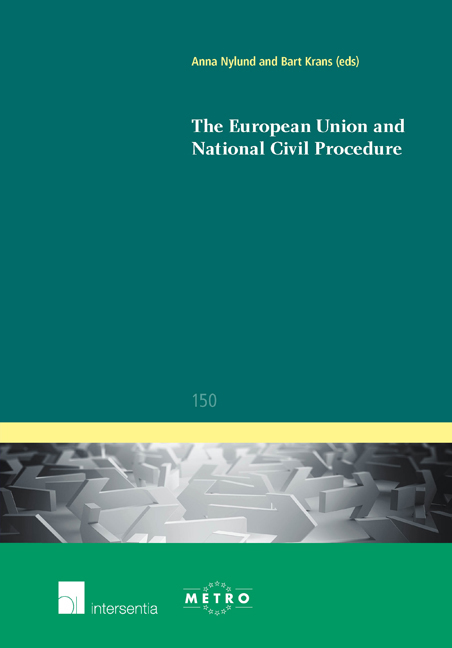Book contents
- Frontmatter
- Contents
- About the Authors
- List of Abbreviations
- The European Union and National Civil Procedure – A Rocky Road or a Smooth Process?
- Some European Challenges for Belgian Civil Procedure
- Danish Civil Procedure and the Internal Market: Impact and Challenges of Sectoral Harmonisation
- European Influences upon English Civil Justice: Tempests or Gentle Breezes?
- European Union and National Civil Procedure: The French Paradox
- The European Union and Civil Procedure from a German Perspective
- Interaction between European Law and Hungarian Civil Procedure Law
- The Impact of EU Law on Dutch Civil Procedure Law
- Norway: An Insider Outside – or an Outsider Inside – European Civil Justice
- Polish Civil Proceedings: How Much Europeanised?
- Slovenian Civil Procedure and the Transformative Power of the EU
- The Curious Incident of the Dog in the Night-Time: Europeanisation of Civil Procedure in Sweden
- Conclusions and Outlook
- Index
- Miscellaneous Endmatter
European Influences upon English Civil Justice: Tempests or Gentle Breezes?
Published online by Cambridge University Press: 19 December 2017
- Frontmatter
- Contents
- About the Authors
- List of Abbreviations
- The European Union and National Civil Procedure – A Rocky Road or a Smooth Process?
- Some European Challenges for Belgian Civil Procedure
- Danish Civil Procedure and the Internal Market: Impact and Challenges of Sectoral Harmonisation
- European Influences upon English Civil Justice: Tempests or Gentle Breezes?
- European Union and National Civil Procedure: The French Paradox
- The European Union and Civil Procedure from a German Perspective
- Interaction between European Law and Hungarian Civil Procedure Law
- The Impact of EU Law on Dutch Civil Procedure Law
- Norway: An Insider Outside – or an Outsider Inside – European Civil Justice
- Polish Civil Proceedings: How Much Europeanised?
- Slovenian Civil Procedure and the Transformative Power of the EU
- The Curious Incident of the Dog in the Night-Time: Europeanisation of Civil Procedure in Sweden
- Conclusions and Outlook
- Index
- Miscellaneous Endmatter
Summary
Introduction
At any rate in legal matters, adverse weather is not confined to that approaching from the West, that is, from the Atlantic Ocean, Bristol Channel and the Irish Sea. European civil justice initiatives continue to sweep across the North Sea to London (the seat of the UK Parliament). These initiatives take the form of EU Regulations, or Directives, or Recommendations issued by the European Union authorities, or European Court of Justice case law, or the jurisprudence of the Strasbourg court on the European Convention on Human Rights.
But how bad is it? Is this easterly weather system nothing more than intermittent gentle breezes or have there been severe storms? The answer is that weather from the East has mostly involved gentle breezes (so gentle as almost to escape notice). But (on some occasions) easterly blasts have exceeded gale force 10: see discussion in section III of the European Court of Justice's ban on anti-suit injunctions and examination in section VII of the Constitutional Reform Act 2005 where the British Parliament created a new United Kingdom Supreme Court, to secure complete separation of functions between the legislature and judicial system, and to ensure that the Lord Chancellor (that is, the Minister of Justice) can no longer sit as a judge. These tempests have changed the landscape of British law and of its institutions and remedies.
European Statutory Changes to English Civil Procedure
Six statutory projects within European Union law have been mandatorily absorbed within the United Kingdom, and other Member States, under the authority of the EU legal framework. Those changes can be listed as follows.
(1) Undoubtedly the most significant of these measures is the system for allocation of jurisdiction and the mutual recognition and enforcement of judgments under the Brussels Convention (1968), which was later adopted by the UK Parliament (the Civil Jurisdiction and Judgments Act 1982), and later embodied as the Brussels I bis (Brussels recast) Regulation (2012). However, the Common Law system was disturbed by the European Court of Justice's ban on anti-suit injunctions vis-a-vis litigious conduct which constitutes a breach of a jurisdiction or arbitration clause (see the trilogy of cases discussed in section III).
- Type
- Chapter
- Information
- The European Union and National Civil Procedure , pp. 31 - 46Publisher: IntersentiaPrint publication year: 2016
- 4
- Cited by



